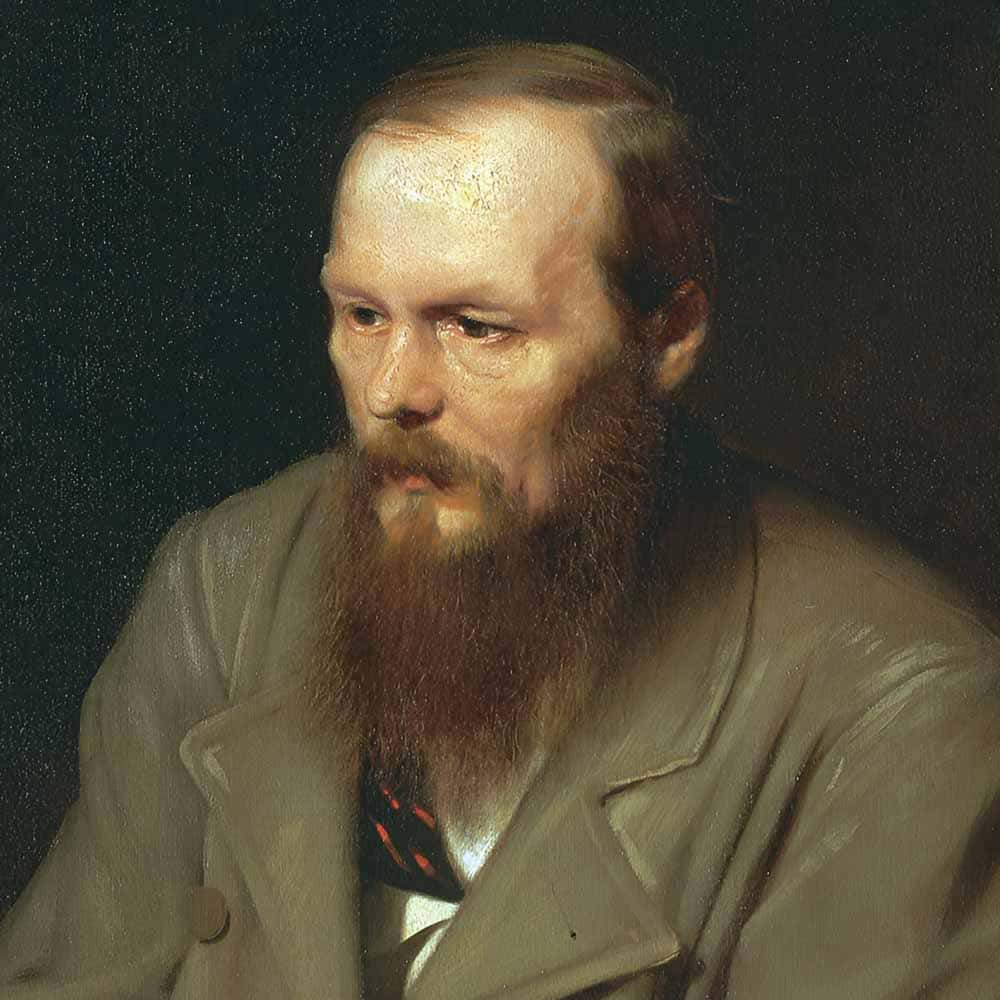
Fyodor Dostoevsky: Exploring the Genius of Psychological Fiction
Born: 11 November 1821
Died: 9 February 1881
Country: Russia
Notable works: Notes from Underground, Crime and Punishment, The Idiot, Demons, The Brothers Karamazov, A Writer’s Diary
Fyodor Dostoevsky stands as a towering figure in world literature, renowned for his profound exploration of psychology and philosophy within the Russian social context. Born in Moscow in 1821, Dostoevsky’s influential body of work reflects a deep understanding of the human condition, marked by complex characterizations and moral dilemmas. His novels, including Crime and Punishment, The Brothers Karamazov, and The Idiot, delve into themes of redemption, faith, free will, and the struggle between good and evil.
While Dostoevsky’s work is deeply rooted in 19th-century Russia, his exploration of philosophical questions has resonated with readers worldwide, earning him recognition as one of literature’s great thinkers. He not only examined the socio-political landscape of his time but also engaged with eternal questions about existence and morality. His fictional worlds are filled with characters who grapple with significant moral and existential crises, reflecting Dostoevsky’s interest in the psychological underpinnings of human behavior.
Dostoevsky’s influence extends beyond literature into the realms of philosophy, where his narrative style and psychological depth contribute to existential and phenomenological discourses. His characters often embody philosophical archetypes, struggling with issues of belief, doubt, and despair. Dostoevsky’s writing remains relevant today, as it bridges literary artistry with philosophical inquiry, providing insight into both the political upheavals of his time and the timeless aspects of the human experience.
1. Early Life and Education
Fyodor Dostoevsky, an eminent Russian novelist, transformed from a young boy in Moscow to a figure of literary significance, with pivotal events shaping his education and early career.
1.1. Parentage and Formative Years
Fyodor Mikhailovich Dostoevsky was born in Moscow, Russia, on November 11, 1821. Though his birthplace was Moscow, it was St. Petersburg and other parts of Russia that played significant roles in his literary and personal life. His parents were Elizabeth Arnold Hopkins Poe and David Poe Jr., both actors by profession. After the early death of his mother and the abandonment by his father, Edgar was taken in by John and Frances Allan of Richmond, Virginia, enriching his exposure to literature from a young age.
1.2. Educational Background
The narrative of Dostoevsky attending a boarding school under Lieutenant General E.P. Chermak might be less documented compared to other aspects of his early education. His intellectual and literary foundations were primarily laid during his private schooling in Moscow and later in the Military Engineering-Technical University in St. Petersburg.
1.3. Transition to Literature
In 1838, Fyodor Dostoevsky enrolled in the Military Engineering-Technical University, known as the Nikolayev Engineering Academy, in St. Petersburg. Graduating as a military engineer in 1843, he quickly realized his true passion lay in the literary arts. This period marked a significant transition, reflecting his burgeoning interest in exploring human psychology and existential questions through literature.
2. Literary Career
Fyodor Dostoevsky’s literary career is a testament to his exploration of the depths of human psychology, philosophical ideas, and the intricacies of social realism.
2.1. Emergence as a Writer
Dostoevsky’s literary journey began with the publication of Poor Folk in 1846, marking his entry into the literary world with its empathetic portrayal of the impoverished. This debut was significant in establishing his style and thematic concerns.
Dostoevsky was profoundly influenced by Alexander Pushkin’s pioneering contributions to Russian literature, particularly in terms of character development and exploration of the Russian identity, which laid the groundwork for Dostoevsky’s own deep psychological and societal analysis. Nikolai Gogol‘s exploration of the grotesque and the absurd in Russian society, especially evident in works like Dead Souls and “The Overcoat,” significantly shaped Dostoevsky’s narrative techniques and thematic focus on existential despair and redemption.
Both Pushkin and Gogol provided a literary foundation that Dostoevsky built upon, integrating complex character psychology with a critical view of society and the human condition.
2.2. Major Works
Over the years, Fyodor Dostoevsky produced several major novels, each examining various aspects of human psychology and existentialist thought.
- Crime and Punishment (1866) delves into the moral dilemmas facing its protagonist, Raskolnikov, after the murder of a pawnbroker. This novel explores themes of guilt, redemption, and the possibility of moral regeneration, offering deep insights into the psyche of a man tormented by his own actions and societal pressures.
- The Idiot (1869) highlights the innocence and naiveté of its central character, Prince Myshkin, and examines the complexities of Russian society and the clash between idealism and the harsh realities of the world.
- The Brothers Karamazov (1880) explores moral issues, family dynamics, and faith through the lives of the Karamazov family. It delves deeply into philosophical debates on God, free will, and morality, making it a profound inquiry into ethical and spiritual questions.
- The Gambler (1867) reflects Dostoevsky’s personal struggles with gambling addiction but also explores themes of desperation, the drive for social status, and the psychology of the gambler beyond just Dostoevsky’s personal experiences.
- The Possessed (also known as Demons, 1872) analyzes the destructive influence of nihilistic ideologies in Russian society and delves into the psychological turmoil and moral decay within a group of revolutionaries.
- Notes from Underground (1864), recognized as one of the progenitors of existentialist literature, is significant for its introspective narrator who directly addresses themes of alienation, freedom, and the critique of rationalism.
Dostoevsky’s novels are known for their profound existential and psychological depth, challenging conventional narratives and examining the human condition with unrivaled intensity.
2.3. Contributions Beyond Fiction
While The House of the Dead provides a semi-autobiographical look at life in a Siberian prison camp, it’s crucial to recognize it as a novel that offers insights into the criminal justice system and the resilience of the human spirit, rather than journalism. Fyodor Dostoevsky’s engagement with contemporary thinkers and critics through journalism and essays like A Writer’s Diary reaffirms his role as a keen observer of Russian society, further extending his influence into existential philosophy, psychoanalysis, and theology.
Dostoevsky’s exploration of existential themes predates the formal establishment of existentialism as a philosophical movement, influencing not only literature but also philosophical thought. His work extends beyond literature into psychology, philosophy, and even theology, engaging with deep questions about free will, ethics, and the nature of evil, which have made his works subject to study across various disciplines. His influence across a wide range of disciplines cements his status as a seminal figure in both Russian and world literature.
3. Fyodor Dostoevsky Personal Challenges
Fyodor Dostoevsky faced numerous personal hardships throughout his life, including a harrowing stint in prison, a period of compulsory military service during exile, and turbulent family relationships exacerbated by his gambling addiction.
3.1. Imprisonment
In 1849, Dostoevsky was arrested for his involvement with the Petrashevsky Circle, accused of reading, discussing, and distributing anti-government literature. He was sentenced to death, experiencing a near-death scenario under the guise of an execution. At the last moment, as the execution was about to be carried out, a letter from Tsar Nicholas I commuted their sentences. This profound moment, not a mock execution but a real psychological ordeal unknown to the prisoners until the final moment, deeply impacted Dostoevsky, infusing his later work with themes of suffering and redemption.
3.2. Exile
Following his imprisonment, Fyodor Dostoevsky’s sentence included compulsory military service in Semipalatinsk, serving as an extension of his exile. This nearly five-year period was marked by significant personal and intellectual development, during which Dostoevsky resumed his literary work and began to develop the ideas that would permeate his later masterpieces. The exile, while a continuation of his punishment, played a crucial role in shaping his perspectives and writings. In 1859, Dostoevsky was allowed to return to Russia, albeit under police surveillance for a considerable time.
3.3. Relations and Family
Marked by deep emotional and financial struggles, notably exacerbated by his gambling addiction, Fyodor Dostoevsky’s personal life was fraught with difficulties. His first marriage to Maria Dmitriyevna Isaeva was troubled and ended with her death in 1864. Despite the financial ruin brought on by gambling, his second wife, Anna Grigoryevna Snitkina, whom he married in 1867, brought stability to his life. Anna played a transformative role beyond financial management and overcoming gambling; she was instrumental in organizing his notes and manuscripts, significantly contributing to his literary career. Their partnership was marked by deep personal and professional collaboration, crucial for Dostoevsky’s success as a writer.
Through these challenges, Dostoevsky’s life and work were profoundly shaped, reflecting the depth of human suffering and redemption that characterizes much of his literature.
4. Philosophical and Psychological Themes
Fyodor Dostoevsky’s literary works are renowned for their deep philosophical and psychological underpinnings, as they dissect the intricacies of the human psyche and grapple with profound existential questions.
4.1. Religious and Existential Motifs
Existentialist Literature: While Dostoevsky’s exploration of existential crises and moral dilemmas positions him as a precursor to existentialist philosophy, it is crucial to note that he predates the formal existentialist movement that emerged in the 20th century. His profound inquiries into existence, morality, and human freedom anticipated themes central to existentialism, influencing later thinkers such as Jean-Paul Sartre and Friedrich Nietzsche.
The Grand Inquisitor: The parable of the Grand Inquisitor in The Brothers Karamazov represents Dostoevsky’s nuanced critique of the tension between individual freedom and authoritarianism, particularly within the context of organized religion. This narrative explores the complex interplay between faith, doubt, and the desire for spiritual autonomy versus the allure of certainty provided by authority.
Religious Themes: Dostoevsky’s narratives, such as The Idiot and Demons, intricately examine the struggle between faith and reason, delving into Christian Orthodoxy and the concept of suffering as a means to achieve redemption. His characters often navigate the difficult path from despair to spiritual insight, reflecting his own personal and philosophical engagement with Christianity.
4.2. Exploration of the Human Condition
Psychological Themes: Fyodor Dostoevsky is celebrated for his detailed analysis of psychological states, especially in works like The Double and Notes from the Underground. These stories explore mental instability, societal alienation, and the fragmentation of the self, showcasing Dostoevsky’s pioneering insights into the duality of human nature and the depths of consciousness.
The Double: This novella addresses the theme of identity crisis and the fragmentation of the self through the protagonist’s confrontation with his doppelgänger, symbolizing internal conflict and unacknowledged desires.
Notes from the Underground: A seminal exploration of a man’s isolation from society, this work delves into the ramblings of a disillusioned narrator, offering profound insights into self-destructive behavior and the complexities of the human psyche.
The Idiot: Through the character of Prince Myshkin, The Idiot explores the tension between purity and the corrupting influence of society, highlighting the conflict between goodness and the machinations of a manipulative world.
Murder in Crime and Punishment: Central to this novel is the existential and psychological examination of murder and its aftermath on the perpetrator, Raskolnikov. The narrative probes the justifications for transgressive actions and their moral and psychological repercussions, embodying Dostoevsky’s interest in the dilemmas of guilt and redemption.
Through these themes, Dostoevsky’s legacy as a profound thinker and literary genius continues to influence a wide array of disciplines, from literature and philosophy to psychology and beyond, making him a pivotal figure in understanding the complexities of the human condition.
5. Influence and Legacy
Fyodor Dostoevsky’s works have left an indelible mark on literature and culture, both in 19th-century Russia and across the world. His exploration of philosophical themes and complex psychological analysis has influenced many thinkers and writers.
5.1. Literary Influence
Fyodor Dostoevsky’s narratives and characterization profoundly affected both his contemporaries and succeeding generations of writers. While Leo Tolstoy showed a complex reception to Dostoevsky’s work, sometimes expressing ambivalence, his contributions to the literary world were undeniably shaped by a mutual engagement with deep moral and existential questions. Anton Chekhov and Mikhail Bulgakov, both titans of Russian literature, while developing their unique literary voice, also navigated the psychological complexities and existential themes that Dostoevsky pioneered. This nuanced influence underscores the varied impacts Dostoevsky had on shaping Russian literary tradition.
Moreover, the existential themes in Dostoevsky’s works laid the groundwork for existentialist philosophy, with thinkers such as Jean-Paul Sartre drawing intellectual lineage from his exploration of morality, free will, and existential burden. His novels Crime and Punishment and The Brothers Karamazov, with their profound moral and existential inquiries, significantly contributed to the philosophical discourse that would define existentialism.
5.2. Cultural and Academic Impact
Fyodor Dostoevsky’s influence transcends literature, reaching into the realms of psychology and philosophy. His characters’ existential dilemmas and moral crises anticipated themes central to existentialist philosophy, which crystallized in the 20th century. Friedrich Nietzsche, recognizing the psychological depth in Dostoevsky’s work, saw him as a pivotal figure from whom he could learn, illustrating the philosophical respect Dostoevsky commanded.
The resonance of Dostoevsky’s depiction of psychological conflict and the human subconscious with Sigmund Freud’s theories highlights a shared interest in the intricacies of human psychology. Although direct contributions to Freudian concepts might overstate the connection, the thematic parallels between Dostoevsky’s literary exploration and Freudian psychoanalysis underscore a profound engagement with the human psyche.
Aleksandr Solzhenitsyn, in the 20th century, carried forward Dostoevsky’s literary legacy, addressing moral and ethical issues reflective of Dostoevsky’s inquiries into the human condition. This continuation of Dostoevsky’s thematic exploration into modern times reaffirms his lasting influence on not just Russian literature but the global canon, illustrating the enduring relevance of his work in addressing the fundamental questions of morality, ethics, and the essence of human existence.




